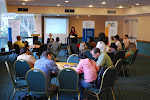Editorial
Aloha Means Hello and Goodbye
Megan A. Conway, PhD
Editor
In the summer of 2001 I was a new faculty member at the Center on Disability Studies (CDS), University of Hawaii, literally fresh off the boat from Berkeley, California and still calling myself “Dr. Conway” with awe and pride after years of pursuing my doctorate-or-die. I was chipper, passionate and dumb. I landed in Hawaii as all Haoles do with preconceived and completely wrong ideas about life in Paradise and an irrational fear of giant cockroaches. And as a disabled white woman from the land of Crip Freedom and Pride, I was also in for an additional shock when confronted by prejudice and inaccessibility. Complaining about my rights under the Americans with Disabilities Act got me nothing but mute stares, mulish put offs and a muttered “show some Aloha.” You think?
I came onboard CDS to coordinate a federal grant focused on transition, but my somewhat (at the time) hidden passion was Disability Studies. I had nabbed the job at CDS partly via a connection between my Berkeley mentor Susan O’Hara and longtime Disability Studies Quarterly (DSQ) Editor David Pfeiffer, who was settling into semi-retirement in Hawaii and was pleased to have me increase the number of faculty with disabilities at CDS from 1 to 2. We were soon joined by fellow Cripstar Steven Brown, and felt ourselves almost overrepresented at our center then comprised of 100 faculty and staff.
By 2003 David had been forced (by his account) to relinquish his editorship of DSQ and had decided to start a new journal, the Review of Disability Studies: An International Journal, with me and Steve as Assistant Editors. I was excited by the prospect of learning about academic publishing and the wild world of Disability Studies under David’s tutelage. And then David died. I did not know David well personally, just had a great deal of respect for him professionally, but I do remember watching the canoes paddle out with his ashes on board thinking, quite selfishly, “now what”?
Now what was the inaugural issue of RDS, published in December of 2004, conceived of and assembled by David and executed with great enthusiasm and limited experience by Steve and me. It was a gargantium issue, with 27 articles, essays, creative works, book reviews and notes from the field. Contributors (in addition to the three noble editors) included legends and novices, the now living and the now passed: Mark Sherry, Reiko Hyashi & Mariko Kimura, Mary Fleming & William Ross, Adam Corrico & Leonard Jason, Jennifer Coles, Janice Dewey & Megan OHare, David Connor, Beth Omansky, Alex Lubet , Steven Gilson & Elizabeth DePoy, Mark Medoff, Jillian Weise, Tanis Doe, Ottmar Paul, Jean Johnson and Steven Taylor. I really have no idea how or why we put together such a big baby, but it was a good baby and the beginning of a creative project that has sustained me through professional hardships and joys for the past 15 years.
As you may have guessed by now, I am leading up to a goodbye. After 18 years with the University of Hawaii and 15 years in various editorial roles with RDS culminating with Editor-In-Chief, I am heading back to California and handing over the reins of RDS to someone new. The baby is now a teenager and ready to try new things. I know that our wonderful Editorial Board, Review Board, Editorial Assistant, and new leadership will keep a steady course and maintain RDS’ relevance in the ever growing field of Disability Studies. I leave the particulars of the “now what” for the new Editor.
If you have made it this far in my monologue about the humanization of an academic journal, you might be curious to know what I am doing next. I am leaving academia for a bit, or forever, time will tell, to work in the “real world”. Sometimes we have to move back to move forward. Sometimes we have to say goodbye to say hello.


